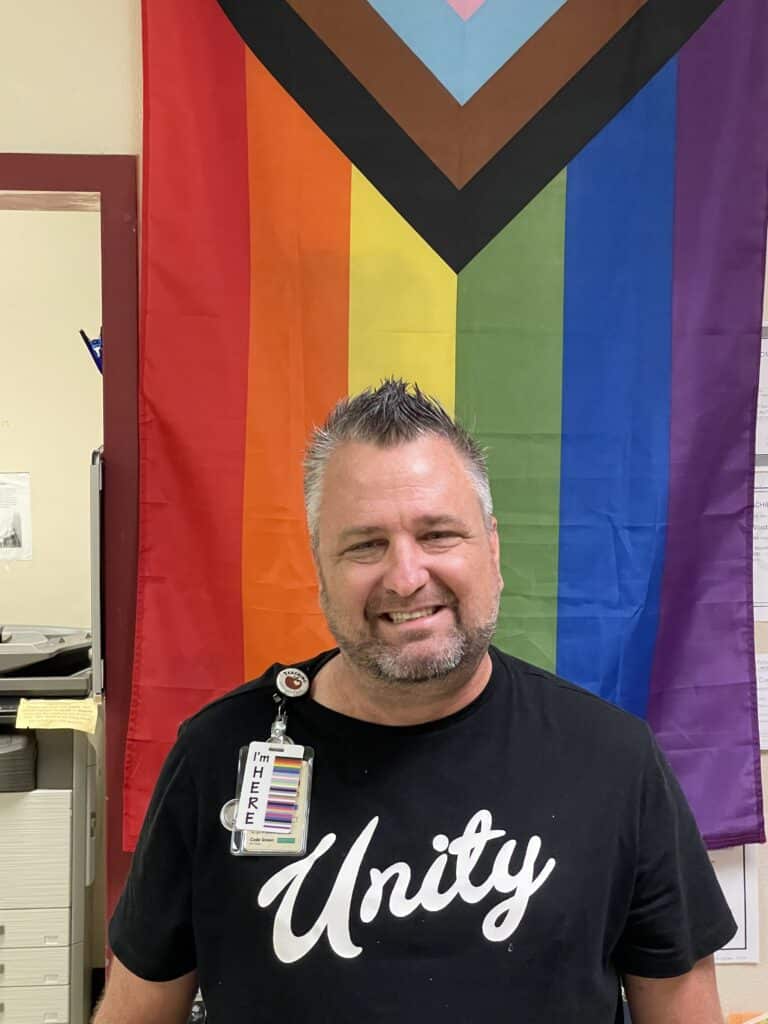After decades of advocacy, teacher Michael Woods remains committed to the work
When times get tough, Michael Woods finds empowerment through advocacy

Michael Woods says, “I remember what it was like to be a kid in this school district and how I felt. … I could have been such a better student but spent so much time worried about getting home (safely), worried about not getting beat up on the bus. When I became a teacher I said, I’m going to make sure that never happens to another kid.”
If you followed news reports on HB 1557, also known as the “Don’t Say Gay” bill, chances are you came across an interview with Michael Woods. Interviews with Woods, an openly gay high school teacher, appeared in several national publications as well as in newspaper stories across the state of Florida.
Woods just wrapped up their 29th year as a special education teacher in Palm Beach County and has been advocating for marginalized communities almost as long as they have been teaching. Woods is a Special Olympics Coach, a former sponsor of their high school’s Gay-Straight Alliance club, and a board member of Compass, which is among the largest and most respected LGBTQ+ community centers in the country, serving more than 25,000 people annually.
Making sure that school is a safe space for all students is personal for Woods, who attended Palm Beach County schools as a student before becoming a teacher there. “I remember what it was like to be a kid in this school district and how I felt. I spent a lot of time thinking about things that had nothing to do with academics,” Woods said. “I could have been such a better student but spent so much time worried about getting home (safely), worried about not getting beat up on the bus. When I became a teacher I said, I’m going to make sure that never happens to another kid.”
It was that commitment to make sure school could be a safe, welcoming place for all students that led Woods to become a master Holocaust educator. Earning this distinction, which involved travels to Germany, Poland and Prague, introduced Woods to Norman Frajman who would become his best friend. Frajman, a 92-year-old Holocaust survivor, has been both an inspiration and a mentor to Woods.
Woods was prompted to take action this legislative session because of a promise they made to Frajman to always be an “upstander.” In the face of the anti-LGBTQ+ attacks from the Legislature, Woods said they were compelled to take action because “Advocacy is a verb, not a noun … if this wasn’t the time I said something, then I was being a fraud.”
One way Woods took action this session was by participating in FEA’s Power Hours — weekly virtual meetings during the legislative session where FEA members and activists from around the state get together to call and write legislators.
Nadine Smith, the executive director of Florida’s largest LGBTQ+ rights organization, Equality Florida, was a special guest on one of the Power Hours and helped inspire participants to call their representatives to ask for a “no” vote on the Don’t Say Gay Bill. Like many people, Woods initially didn’t like the idea of being on the phone and talking to legislators, but they noted “the more you do it, the less afraid you are.” Beyond making phone calls and writing to legislators, Woods also came to Tallahassee twice during the legislative session.
While in Tallahassee, Woods heard homophobic remarks from legislators as well as members of the general public testifying in favor of the bill. Woods was left “feeling really disheartened.” But that feeling didn’t stay long. Because of their advocacy, Woods was interviewed by multiple news outlets and used those opportunities to continue to push for safe, welcoming schools for all students. Continuing to find their voice and to practice advocacy as a verb resulted in Woods no longer “feeling downtrodden. I felt empowered.”
Looking ahead to what it means to teach now that “Don’t Say Gay” has been signed into law, Woods says, “Being asked to be silent as a teacher is destructive. A law is not going to keep me silent.”
Woods has kept their commitment to not staying silent this summer. They led a course on Creating Equity through Allyship and Understanding at FEA’s Summer Academy. Up next, Woods is working with FEA’s Professional Development department to create a training for teachers on the rights of LGBTQ+ students in Florida’s schools.
Asked if they had any final thoughts to share, Woods stressed the importance of motivating as many others as possible to get involved with their local union, “If you are upset about what you perceive the union did, or did not do, join me next year. And we can make sure that everything that needs to get done gets done. The more people we have, the more we get done.”

